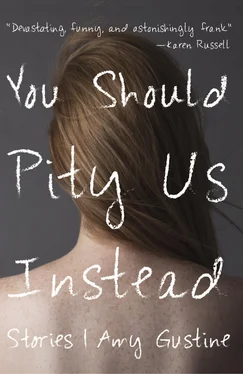The girl’s face had gone blotchy. The old woman and the boy rushed forward. Spencer tried to dodge, but she hit him with her canvas bag while the boy grabbed the girl’s free arm and knitting needles clicked out onto the tile floor. The old woman was shouting. He thought it sounded like the universal language of profanities. Miriam’s shawl fell on the floor. People were staring. The boy hollered, “You hurt her!”
Spencer realized he could feel Miriam’s humerus. He let go. Hauss was staring. The bedraggled faces of those in line were staring. The damn old woman and her boy refused to look away.
Spencer walked back to his station and snatched a piece of chalk. He wrote CT on Miriam’s pleated blouse, then motioned for the old woman to step forward. On her right shoulder he drew a large blue X with a circle around it.
An inspector had come up to see what the ruckus was. “Mental defective?” he asked, watching the old woman move down the line with Miriam and the boy.
“Yes,” Spencer said. “I could see it in her eyes. She’s not all there.” He hadn’t bothered with the boy. He would go back with her automatically, and later, Spencer would find Miriam in the infirmary and comfort her.
The inspector walked off. Spencer rearranged his chalk into neat, clean lines. Hauss had returned to work, but seemed distracted, checking and rechecking his damn clipboard. God, they’d be here all night! Spencer smoothed his shirt and tie. Everything was fine. The old woman and her boy would be gone soon. He motioned with his finger for the next person. A man stepped forward, Spencer looked him over quick — catch up now or never, he figured — and waved him through. Then a woman and her daughter, a young couple.
Spencer waved them through quickly, then scanned the line for Miriam. She, the boy, and the old woman were still several people short of the next station, where inspectors checked for chalk marks and put the ones for return in one wired area, the ones for treatment in another. The three of them were deep in conversation. Then Miriam smiled and turned away, stepping forward in line as he knew she would. She had nothing to do with that annoying kid and his mother. Spencer was about to look away when he saw Frederick motion to the old woman’s shoulder. She slipped off her coat and looked at the mark, then said something to the boy.
“Put the damn coat on and get going,” Spencer muttered. He glanced down the line. Hauss was still flustered. He could see it in his hands, the way they fluttered the pages on the clipboard.
He looked back. The old woman and the boy were hunched together, talking. Then she began to roll up her coat. She removed a pile of yarn from her little bag, stuffed the coat in the bottom, then replaced the yarn on top.
Spencer began to step out from the iron pipes, the words almost in the air—“What do you think you’re doing?”—then stopped. The boy was tapping Miriam on the shoulder, saying something. After a moment, she rubbed at the mark on her blouse vigorously, then covered the smudged blue with her shawl.
In three years not one person had thought to do anything about the marks he chalked on them. Of all those he had diagnosed — which must add up to thousands — the old woman and her boy were the first to understand: it is not good when they mark you apart.
Spencer watched the three of them proceed past the wire compartments, down into the main inspection lines, where they would be asked for their papers, which he’d already seen were in good order. Afterward they’d retrieve whatever remained of their luggage, then step out into the cold and the strangeness of a land they had never seen, didn’t know, couldn’t speak to. For those who left here there was no language, only sound. There was no knowledge, only hope. Once you stepped off the Island the marks you carried could not be stuffed in a bag or washed off a garment. Spencer wanted to call after them, to tell them he was sorry. To holler out “Good luck!” but someone had walked up, another old woman, this one with two boys and an old man. Spencer laid down his chalk and slowly reached for their eyes.
YOU SHOULD PITY US INSTEAD
When Simon and Molly moved from Berkeley back to her hometown in Ohio, Molly was surprised to discover how many people still believed in God. They’d bought in a neighborhood with an excellent public school, near the university where Simon had snagged Chair of Philosophy. There were conflicted Jews, closeted Muslims, casual Lutherans, and hennaed Hindus, but it soon became clear the diversity provided no cover. For most people Adonai, Muhammad, Christ, and Vishnu could be treated as vernaculars. Same thing, different name. The particular dogmas didn’t have to be debated or justified. Everyone could just get along. Except atheists. They still offended people.
Last year the subject of religion came up at school. Molly’s oldest daughter, Kate, was asked “what she was” and when she said she was nothing, the other kids insisted this was impossible. “You have to be something!” After that Molly started coaching the girls — Kate was in the fourth grade and Emma was in first — on the polite things you say when asked about religion. It was all working out fine until Simon’s book came out.
Riding in on the same wave as Harris’s, Hitchens’s, and Dawkins’s condemnations of religion, The Great Cults: How Religion Warps Minds and Hearts received both more attention from the lay public and less respect from academia than it otherwise would have. Several reviewers called it “derivative” and now Simon has to come up with something “ground-breaking” for the next book. Under this pressure, he’s been in no mood to help Molly negotiate the social fallout from the front-page story their local paper ran quoting The Great Cults’ most inflammatory passages. Because of the article, invites to card nights and progressive dinners have dried up and the girls have been skipped over for several birthday parties and sleepovers. At school, no one gives Molly more than a perfunctory nod during pickup and dropoff.
To smooth things over, she tried placing Simon’s criticism in light of Catholicism’s more spectacular failures. Surely some of the other mothers had been traumatized by a crucifixion movie? Questioned why billions of Chinese were eternally damned for not worshipping a God they never heard of? No dice. The word had gotten out: it wasn’t the mistakes of a few or the odd papal ruling Simon questioned. It was the basic intelligence of those who had faith.
Last month Molly began trying out a new line. With a little wave and a grin, as if she were apologizing for an overgrown lawn or unpainted shutter, she’d say, You should pity us who have no faith. We’re lonely and anxious. A few women took her seriously and suggested she try their church. The hippest ones forced a burst of air through their noses to indicate they weren’t too old for irony. The rest gave a one-sided, closed-lip smile, as close to a sneer as forty-year-old mothers get. Molly knows it’s time for a new line, but as yet nothing’s come to her.
Tuesday morning she picks up her grandfather for the weekly grocery trip. His house, a box at the end of a row of other postwar boxes across from a cheese-processing plant, is nearly as small as her garage, but when she pulls onto the makeshift gravel curb, the crunch under her tires sends a primordial comfort through Molly’s veins. After her parents divorced, she lived with her grandparents during the week. In the summer Grandma Alice played make-believe with Molly on the platform swing — train conductor, trapeze artist — and in the afternoon they watched soap operas. Now Grandma Alice is gone and Molly’s mother lives in North Carolina with a man she met there named Dave something. This leaves Grandpa Hank to Molly and she doesn’t mind at all. In fact, it’s the most fulfilling time of her week. For the next few hours they will go shopping for bran cereal and talk of things that can be fixed. Leaky gutters. Drooping plants. Overdue library books. Her grandfather will thank her for her trouble and try to pay for her gas, which she will laugh at and refuse.
Читать дальше












